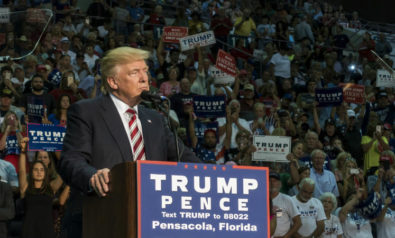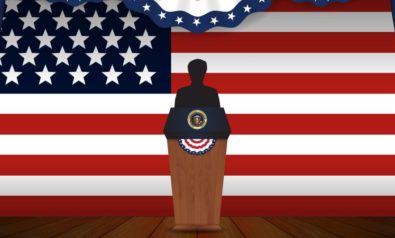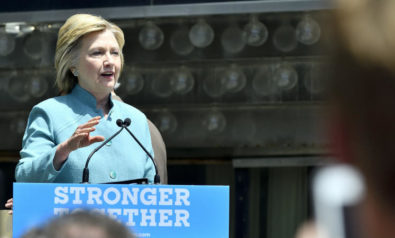Closing our eyes to Donald Trump will not make him go away. John Feffer explains.
In my senior year of college, my Russian teacher pulled me aside. He told me that the Central Intelligence Agency (CIA) was recruiting on campus. I should consider applying for a job.
It was 1986. Mikhail Gorbachev had taken the helm of the Soviet Union, but the Cold War was still very much in place.
“The CIA?” I said. “Really?”
“I know your politics,” my professor said. “But don’t you think it’s better for the CIA to have analysts who are smart and speak Russian well? Don’t you think that will better serve the cause of peace?”
However flattered I was by his assessment, I was not tempted. I didn’t like what the CIA was doing around the world, and I was under no illusions about what one person could do to change such an institution from within.
“I would prefer not to,” I told him.
I was echoing the character of Bartleby the scrivener who, in the Melville short story of the same name, initially works hard at his Wall Street job and then, mysteriously, refuses to do anything at all. After my polite refusal to consider CIA employment, I embarked on a path that would take me ever further away from government service.
Today, all of America faces the Bartleby challenge. A small number of hard-right conservatives—Newt Gingrich, Rudy Giuliani, John Bolton, Mike Flynn, Steve Bannon—made the decision to side with Donald Trump during the election campaign. They expressed no reservations about Trump’s disqualifications, worked hard on his behalf and will soon reap the benefits of their opportunism.
Most Democrats—and a sizable number of #NeverTrump Republicans—never imagined that the billionaire would ever get near the White House. Now they have to decide: Will they engage with the Trump administration, or will they prefer not to?
Within this anti-Trump camp, two factions have emerged.
The exceptionalists believe that American democracy is strong enough to withstand the gale force winds of Hurricane Donald, so it’s better to get behind the levees to help with the sandbags. Perhaps they can moderate the fury of his attacks; perhaps they can find common ground on some popular economic projects.
The rejectionists counter that the new president is an autocrat who doesn’t believe in democracy, so it’s better to resist Trump at every step. Work with the devil, and you’re doing the devil’s work.
Each faction has a compelling argument to make. Columnist Dana Milbank, for instance, was one of the strongest voices in The Washington Post against Trump’s candidacy. In his first column after the election, a letter to his daughter, Milbank issued the following appeal:
“First, we must try to help Trump succeed. I urge Republicans of conscience to join his administration, to temper his worst instincts, as I hope Vice President-elect Mike Pence will. Six years ago, the top Republican in the Senate said his top political goal should be defeating President Obama. I hope Democrats don’t act that way. If Trump drops the crazy talk of the campaign, he could easily find compromises on the economy and immigration. Trump reinvented himself for this campaign. He’s capable of remaking himself again into a practical leader.”
Many politicians (Hillary Clinton, Barack Obama) and many prominent Trump critics (Nicholas Kristof, Thomas Friedman) have shared this approach. Call it the Bartleby A position: the scrivener as a diligent and responsible worker.
Contrast that perspective with Masha Gessen, writing in The New York Review of Books. She speaks from her experience growing up in the Soviet Union and navigating the politics of Vladimir Putin’s Russia. Institutions, she warns, will not save America from Trump the autocrat:
“Democrats in Congress will begin to make the case for cooperation, for the sake of getting anything done — or at least, they will say, minimizing the damage. Nongovernmental organizations, many of which are reeling at the moment, faced with a transition period in which there is no opening for their input, will grasp at chances to work with the new administration. This will be fruitless — damage cannot be minimized, much less reversed, when mobilization is the goal — but worse, it will be soul-destroying. In an autocracy, politics as the art of the possible is in fact utterly amoral.”
This is a classic restatement of the “anti-politics” position of dissidents living in the former Soviet bloc. It was, as history turned out, the right position. Non-cooperation with the Communist regimes gradually undermined their legitimacy, and they collapsed. Call this position Bartleby B, when the scrivener was in his “I would prefer not to” mode.
It will probably be no surprise to learn that I lean in Masha Gessen’s direction. Here’s why.
Negotiating with Evil
“We don’t negotiate with evil,” former Vice President Dick Cheney infamously said in 2003. “We defeat it.”
Cheney was referring to North Korea. The George W. Bush administration was trying to figure out what to do with the government in Pyongyang: negotiate with it or try to initiate regime change. For the first six years, the Bush team tried the latter strategy. The regime didn’t budge. For the last couple years, however, the Bush administration attempted to negotiate through both bilateral and multilateral means. Cheney was not happy.
I supported diplomatic engagement with North Korea. So why on earth would I favor negotiating with an undemocratic, tyrannical, human-rights-abusing regime and recommend resistance to the Trump administration, which won power through democratic means?
It’s quite simple. I believe that engagement with North Korea is the best way of changing the system there through trade, cultural exchange and political contact. Isolation has only further hardened the system—and there are no viable alternatives within the country that can replace the Kim dynasty (except for the military, which isn’t likely to be any better).
Americans, however, live in a democracy (for the time being). We have strong, democratic alternatives. We can organize to blunt Trump’s power two years from now. We can mobilize to defeat Trump four years from now. And, more importantly, we can do whatever we can outside the voting booth to throw sand into the gears of the Trump juggernaut.
But what if Trump implements policies that I support? He’s no fan of free trade agreements. He wants to avoid a war with Russia. On the domestic side, he favors investments in infrastructure and other job-creation efforts.
Yes, and Adolf Hitler built the Autobahn, Benito Mussolini made the trains run on time (actually he didn’t), and Joseph Stalin dragged the Soviet economy kicking and screaming into the 20th century.
Conservatives like to say that soft-hearted liberals and cultural relativists don’t believe in evil. Well, all three of those fellows were evil. And so is Donald Trump (and some conservatives, I’m heartened to see, agree). And when Trump is too inconsistent or distracted by his Twitter account to be truly evil, a cohort of super-villains that he has assembled—alt-right nutcases like Bannon, law-and-order fanatics like Giuliani and aspiring world-destroyers like Bolton—will fit the bill nicely.
I won’t try to stop policies that I think are good for the country or the world during the Trump era. Rather, I’ll devote my energies to blocking all of the malign effects of the new administration—on immigration, climate change, military spending and the like.
How to translate “I prefer not to” into concrete action?
Here’s one great initiative that recently arrived in my inbox. If Donald Trump requires Muslims to register in the United States, I too will register as a Muslim. You can do the same here. “Sanctuary cities” like Chicago, Philadelphia, Seattle and DC have all pledged to refuse to cooperate with federal authorities in deporting immigrants. In a courageous Facebook statement, Governor Andrew Cuomo declared that New York State will provide safe haven for anyone who “feels that they are under attack.”
Soon we may be called upon to stand with all embattled minorities. And thus we become an emboldened majority.
On Non-Cooperation With Trump
It’s easy enough for me to say “I would prefer not to” when it comes to the Trump administration. I’m about as far away from the corridors of power as one can be and still live in the DC area. It’s not like the Trump team is going to knock on my door and offer me a position. If there’s going to be any knocks on the door from the president’s men, it will probably be after midnight and for a more ominous reason.
Indeed, my first impulse after reading the results of the election was to return to my bed and pull the covers back over my head—I preferred not to acknowledge reality. The prospect of reading the newspapers over the next four years, with Trump’s face front and center, sickened me. The idea of writing about foreign policy issues during the Trump era struck me as little more than fiddling while Rome burns. And I’m not looking forward to living and working in DC when Trump’s henchmen arrive in their limousines.
Closing my eyes to Trump, however satisfying in an infantile way, won’t make him go away. Nor is “strategic patience”—the Obama approach to dealing with the North Korean regime—going to suffice for Trump. In fact, even the “I prefer not to” position of Bartleby B is not good enough.
In Melville’s story, Bartleby ends up starving to death in prison, never having explained his passive resistance. That scenario doesn’t appeal to me. So, let’s consider Bartleby C, in which we all borrow the battle cry of the pro-Trump crowd: We’re fed up, and we’re not going to take it anymore.
Let the next four years of anti-politics begin.
*[This article was originally published by FPIF.]
The views expressed in this article are the author’s own and do not necessarily reflect Fair Observer’s editorial policy.
Photo Credit: Bastiaan Slabbers
Support Fair Observer
We rely on your support for our independence, diversity and quality.
For more than 10 years, Fair Observer has been free, fair and independent. No billionaire owns us, no advertisers control us. We are a reader-supported nonprofit. Unlike many other publications, we keep our content free for readers regardless of where they live or whether they can afford to pay. We have no paywalls and no ads.
In the post-truth era of fake news, echo chambers and filter bubbles, we publish a plurality of perspectives from around the world. Anyone can publish with us, but everyone goes through a rigorous editorial process. So, you get fact-checked, well-reasoned content instead of noise.
We publish 2,500+ voices from 90+ countries. We also conduct education and training programs
on subjects ranging from digital media and journalism to writing and critical thinking. This
doesn’t come cheap. Servers, editors, trainers and web developers cost
money.
Please consider supporting us on a regular basis as a recurring donor or a
sustaining member.
Will you support FO’s journalism?
We rely on your support for our independence, diversity and quality.














































